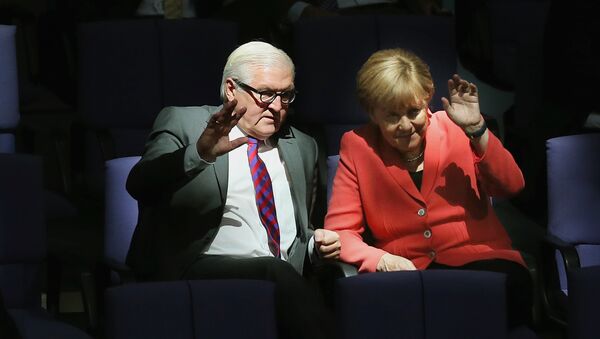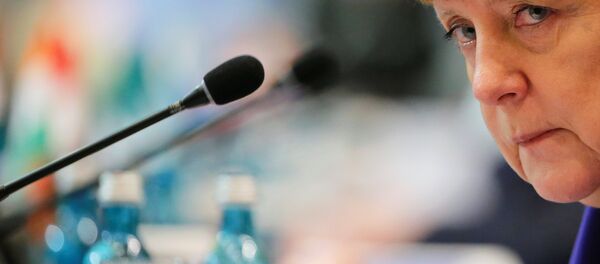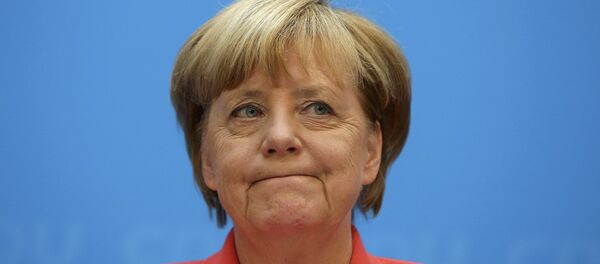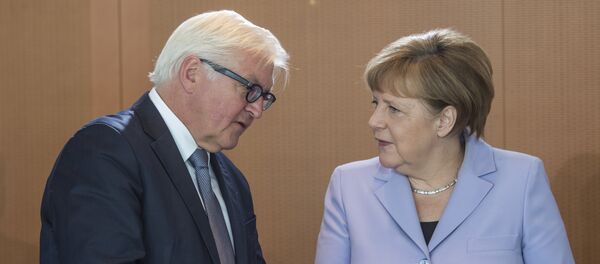Frank-Walter Steinmeier is one of Germany's most popular politicians. According to recent polls, he is ahead of both Chancellor Angela Merkel and Finance Minister Wolfgang Schauble, whose candidacy was also considered by the Christian Democratic Union of Germany (CDU) and the Christian Social Union (CSU).
While the role of the Federal President is often regarded as a "demotion" for an ambitious policymaker, Dr. Nils Diederich, Professor of Political Science at Berlin's Free University, does not share this stance.
"It seems as if the Federal President has little powers. But he is, after all, the one who proposes the next Chancellor to the Bundestag," he noted in an interview with Sputnik Deutschland.
In his September interview with Sputnik Professor Diederich called attention to the fact that German Chancellor Angela Merkel's party is losing its positions to right-wing populist party Alternative for Germany (AfD).
"I think this may be the beginning of the end of the great coalition. The former big parties — CSU and SPD [Social Democratic Party] — are so small now that they have to fear for their existence," Dr. Diederich remarked.
According to the German academic the next Bundestag will likely comprise seven parties, including the CSU.
"There will probably be seven parties [in the Bundestag] — if the CSU is included as an independent party. Under these circumstances it would be no easy task to create a coalition, and the Federal President could play an important role here," he pointed out.
The decision to choose Steinmeier as the presidential candidate has acquired new meaning in light of numerous reports regarding Angela Merkel seeking a fourth term as Germany's chancellor.
During his interview with CNN, Chairman of the Bundestag's Committee on Foreign Affairs Norbert Roettgen confirmed that Merkel will run for chancellor next year.
"She will run for chancellor… She is absolutely determined, willing, and ready to contribute to strengthen the international liberal order. But we can't see the chancellor or Germany as last man standing," Roettgen told CNN.
Given all these, Merkel's support for Steinmeier looks like a "tactical move."
Dr. Diederich explained that if Merkel proposed a candidate from her own party he could have a chance only in the event of AfD supporting him. However, the CDU-CSU alliance wants to avoid that at all costs.
However, according to Jorg Meuthen, a spokesman for AfD, Merkel's move highlights a deep internal crisis within the CDU.
"The decision of the CDU to label Steinmeier as a candidate for the Federal President's office and to characterize this choice as 'reasonable' is symptomatic of the desperate state of the CDU and consistently unreasonable," Meuthen said in a statement obtained by Sputnik on Tuesday.
Indeed, speaking to Sputnik following Willy Wimmer, a former Parliamentary State Secretary in the German Defense Ministry, nailed the German political establishment for what he called "intolerable" rhetoric.
"I think that the President of the Federal Republic, the Federal Chancellor, and, above all, the Foreign Minister, have not taken into account the interests of the German people. By [offering] one-sided support for one candidate and partially offensive comments about the other they have done the German people a lot of harm," Wimmer pointed out.
For his part, American journalist and Editor at China Network Television (CNTV) Tom McGregor suggested that Europe may face the "circulation of elites" following the US election.
"We can expect to see more populist politicians, from the Left and Right, to win more elections," McGregor told Sputnik.





